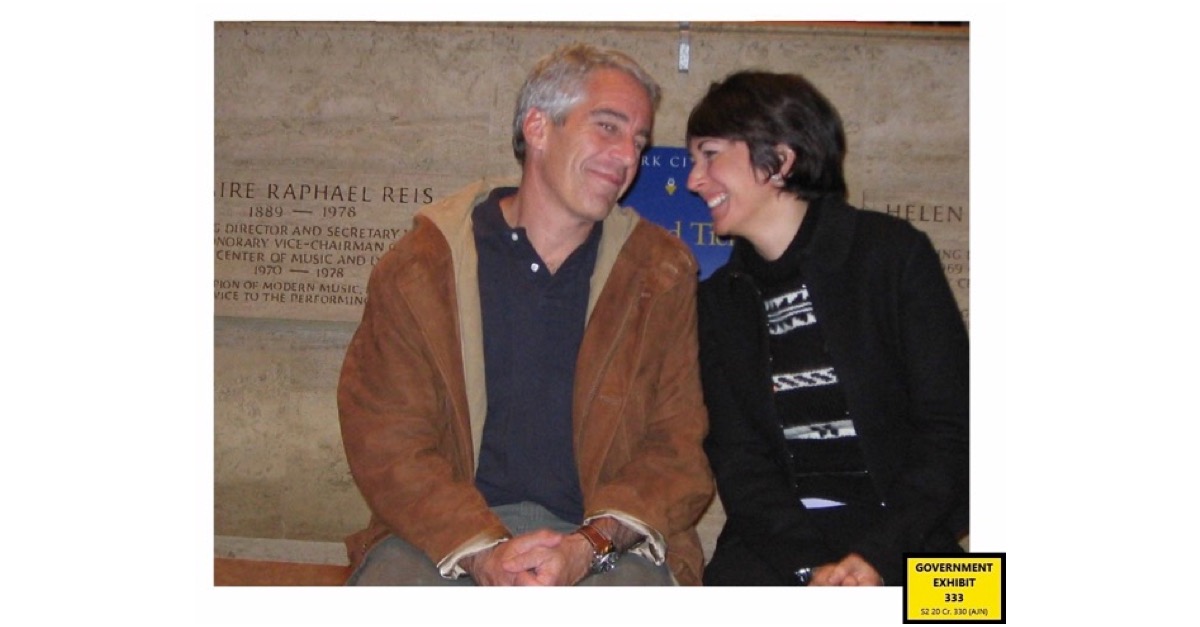
Photo courtesy DOJ
Jurors in the case of accused Jeffrey Epstein accomplice Ghislaine Maxwell continued to examine reams of evidence without reaching a verdict on Monday, the fourth day of deliberations and the first following the holiday recess.
Maxwell, who was born on Christmas, turned 60 years old over the break, and she spent both events behind bars inside Brooklyn’s Metropolitan Detention Center, where she has spent her pre-trial detention. If convicted on six charges—largely alleged violations of the Mann Act and sex trafficking counts—the Brit could effectively spend the rest of her life in a U.S. prison.
The first week of deliberations, cut short because of the holidays, adjourned after two full days plus some 45 minutes following closing arguments without a verdict.
Jurors kept busy throughout that time, requesting transcripts of testimony from Maxwell’s alleged victims “Jane,” who testified under a pseudonym; Carolyn, who took the stand using only her first name; and Annie Farmer, the only accuser to testify under her full and true name.
Later that week, the jury requested transcript of testimony by Epstein’s ex-house manager Juan Alessi and the final accuser “Kate” (not her real name). As “Kate” was above the age of consent in the relevant jurisdictions, U.S. District Judge Alison Nathan instructed the jury that she is not an alleged victim, but they could consider her testimony if they find it relevant to the issues before them.
Scrutinizing both the prosecution and the defense cases, jurors asked Judge Nathan during the first week of deliberations to clarify whether Farmer’s testimony could be considered for two of the conspiracy counts against Maxwell. At the time, Nathan informed them: “The answer is yes, you may consider it.”
During the first week, the jury also asked for notes from the FBI’s 2007 interview with Carolyn, but those records were not in evidence. Experts note that the request, however, could show at least one juror is taking the defense’s central claim seriously: the proposition that Maxwell’s alleged victims changed their stories before taking the witness stand.
On Monday, jurors signaled their intention to studiously consider the evidence. They requested multicolored “Post-It” notes, various colors of highlighters, and a white-paper board. They also requested transcript of testimony by “Matt,” the ex-boyfriend of “Jane” who backed up parts of her account.
“Matt” testified that “Jane” called Epstein her “godfather” and blew up when asked about the money the late sex offender gave her. He recalled her saying the “money wasn’t fucking free.”
Minutes after requesting “Matt’s” testimony, jurors also asked to scrutinize the account of yet another witness: Gregory Parkinson, a retired police officer who told the jury about the Oct. 20, 2005, search of Epstein’s Palm Beach residence.
Parkinson also went to the same house some two years earlier in 2003, after Epstein reported a burglary. Alessi, whose testimony jurors have before them, acknowledged that he stole money from his old boss that year. Maxwell’s defense team has used that admission to undermine the credibility of his damaging testimony that he remembered “Jane” from the period where she was allegedly abused.
“Strikingly beautiful girl,” Alessi said of “Jane.”
Alessi told the jury that she was one of two girls that he thought looked “underage” The other was Virginia Giuffre (née Roberts), whose civil lawsuit against Maxwell helped spark her criminal prosecution.
“She looked young. She had blonde hair, and she had a long white uniform, like a nurse’s uniform,” Alessi said of Giuffre.
Giuffre was not called by the prosecution or the defense as a witness.
On Monday, jurors sought an additional legal instruction: the definition of “enticement,” a word found in the first two of the six charges in Maxwell’s indictment. Variations of the word appear some 21 times throughout the document. Judge Nathan informed them that one definition appears in their jury charge, saying the words have their “ordinary, everyday meanings.”
She also told the jurors: “I will then say further ‘entice’ means to ‘attract,’ ‘induce’ or ‘lure’ using hope or desire.”
Just before deliberations closed on Monday, jurors returned a note suggesting confusion about the fourth count—accusing Maxwell of transporting “Jane” with the intent to engage in illegal sexual activity. Jurors asked whether they could convict on that count if they found Maxwell aided in “Jane’s” return flight from New Mexico but not to that state.
The note operated under multiple false premises: The relevant element of the count concerns a violation of New York, not New Mexico, law.
“Clearly, they’re making an error as to which state begins with ‘New,'” Maxwell’s attorney Bobbi Sternheim quipped.
There is also no evidence in the record concerning “Jane’s” return flight from New Mexico, Sternheim’s co-counsel Christian Everdell noted.
Though the defense wanted to answer the question as a simple “no,” Judge Nathan found the note too murky, legally and factually, to give a conclusive answer. She told the jurors to revisit the 80 pages of instructions she provided them before their deliberations began.
As another full day of deliberations came and went without a verdict, Judge Nathan also told jurors they would start defaulting to longer days. Jurors have typically adjourned deliberations at 5 p.m.
Over the defense’s objections, Judge Nathan asked them to stay an hour longer. Maxwell and her lawyers shook their heads as the judge said she had discretion to set deliberation times, over defense assertions that this would pressure the jury toward a verdict.
Responding to this concern, Nathan told the jurors they should “take all the time” they need.
Deliberations will continue on Tuesday morning.
(Photo via DOJ)